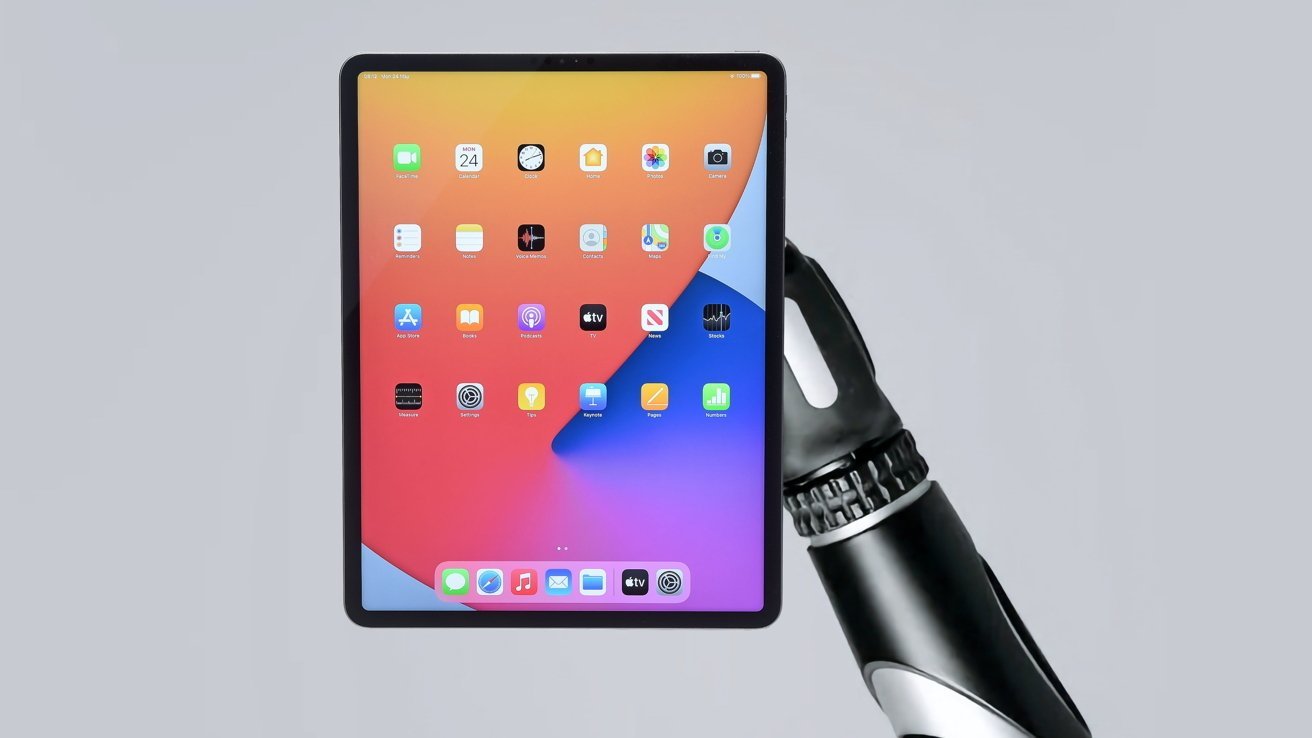Apple's potential push into robotics is due to needing new ways to expand, with the first-world problem solutions potentially introducing a new personality like Siri.
Apple's exploration of robotic products is already known about, such as the allegations it has worked on a robot arm with an iPad attached to one end. However, the rationale behind the effort is a product of its own creation.
The move to moving hardware is because Apple is keen to look for new product categories that it can expand into. In Sunday's Bloomberg newsletter, it is explained that Apple already penetrates the vast majority of its customer's lives, from iPhones and Macs to wearables and even the Apple TV.
While it does work to improve its hardware, it's proving to be difficult to introduce a new product in a similar field that's distinct and groundbreaking enough to be worthwhile.
The last big effort in the product category to actually see release was the Apple Vision Pro, which is still in the beginning stages of its product life. The attempt to develop the Apple Car was certainly a major project for the company, but it ultimately got dropped once again.
While it is a costly failure for Apple, it did apparently trigger some internal pondering. Sometime in 2020, engineers started to wonder what it could do with hardware that could move.
At the time, engineers were considering the Apple Car to be basically a large robot on wheels, and that technology from its development could be used in other areas. However, while movable devices could have a lot of crossover with existing product categories, it could excel in some areas: first-world problems.
For example, hardware that moves could come to the user, instead of relying on the user to fetch it for themselves. If it's just out of reach, maybe it could be moved a few inches closer for the user to use.
The report also offers other ideas, including video conferencing or photography sessions when you're not sitting in front of the device or holding it. Teleconferencing could also extend to allowing users to look around their home, while out and about.
An iPad on a robot arm is only one concept, but Apple believes it could one day offer hardware that can handle household chores. However, the idea of an Apple version of Rosie the Robot from The Jetsons is still a far-off fantasy.
More expertise
Current work in the field is headed up by Kevin Lynch, VP of technology who worked on the Apple Car team. He reports to Apple's AI management and is working with the hardware engineering division's robotics teams.
While its existing in-house teams are already well-versed in robotics, Apple's still bringing in more experts. It has reportedly hired experts from firms like Israel's Technion to move the needle on the effort.
Adrian Percia, M&A chief at Apple, also met with Boston Dynamics a few years, ago with a view to acquisition. Hyundai eventually heavily invested inBoston Dynamics in 2021.
A new Siri?
While Siri is ubiquitous throughout the Apple ecosystem, it may not necessarily be what you will speak to when dealing with the robotic hardware.
Apple is said to be working on a "humanlike interface based on generative AI," sources say. It will also run on whatever tabletop devices and other future robotic hardware, instead of relying on the cloud.
Though this could mean Siri is sidelined for one category of products, it wouldn't be unreasonable to expect Siri to work with whatever personality is created. Apple does work to maintain a cohesive ecosystem, so communication between the intelligent platforms will be crucial.
However, the prospect of cooperative digital assistants does rely on Apple actually bringing some form of robotic product to fruition.
It may have already put billions into its failed car project and could revive what it can from its research. But even so, that failure also demonstrates that Apple is unafraid to spend heavily on moon shots that may not necessarily pan out.
There's word of the iPad-on-arm product being targeted for a 2026 or 2027 release. It remains to be seen if that will become a reality.
 Malcolm Owen
Malcolm Owen







-m.jpg)






 Marko Zivkovic
Marko Zivkovic
 Mike Wuerthele
Mike Wuerthele
 Christine McKee
Christine McKee
 Amber Neely
Amber Neely
 Sponsored Content
Sponsored Content
 Wesley Hilliard
Wesley Hilliard

 William Gallagher
William Gallagher








11 Comments
Looking forward to the day I can wake up and say "Siri, bring me my coffee...", and have it brought to my bed.
I always figured that any kind of robotics with Apple going forward would necessarily be an extension of HomeKit (or whatever it's called now) by creating more tactile and/or interactive mechanisms that depend on being mounted, stored, travelling through, or otherwise being within the physical realm of your household. This may be some kind of system of arms, mini-drones, and screens that can mount, re-locate, and re-orient it-/ themselves- to undertake a lot physical tasks - like a physically-distributed butler - above and beyond Tesla's and roomba's offerings, even that of many hospitals or assisted-living environments - likely meaning adjustment or re-design (or new option) of interior spaces/ walls/ ceilings. AppleHouse sorta like an Aardman set. sorta like the Brazil protagonist's living abode, but Apple.
First and foremost a robot has to do something that I need. A Roomba does something I need, a programmable thermostat does something that I need. The robotics company I worked for made systems that would crawl into spaces that were too small / too hazardous to have a person do it. We sold them to people that needed a system that would do that. Apple has to make a robot that does something I need. An iPad on an arm isn’t it.
Calling this kind of research or work "solving first world problems" is just another way for Bloomberg to paint Apple in a negative light. It's insinuating that these endeavours are somehow "fluff' or superfluous. To some folks, like those with full mobility, no physical or dexterity issues, having a robotic arm to reposition a device in front of their face or retrieve an item may be considered unnecessary. But for those folks who need additional assistance due to physical or mobility imitations, having a robotic helper to help them have more independence can be a major quality of life issue.
Some folks may ask why not simply hire a human to help with these sorts of things, after all, they are usually less expensive than a technology based solution. The problem with only having the "hire a helper" option is the very difficult challenge to finding people willing or able to help serve in that capacity. At least in the US, finding quality home health care providers, or even qualified and willing-to-work employees in any field, is very difficult. Application wise, it's not an either-or solution because everyone in need of these services doesn't require the same level of help. Things like the technology described here aren't being asked to handle any of the more difficult challenges of home health care or personal helpers, but the few things this technology can help with can be extremely valuable to those who can benefit from it. Small changes can have a profound impact on people's lives.
All of these authors that obsess endlessly about Apple's failures and shortcoming, Apple Car being their favourite target, must never have been involved in bringing any complex or challenging new product to market. Like they say, if anyone could do it then it would already have been done. New ventures at any level require learning, and making mistakes is a part of the learning process. How many rockets did Space X (and NASA) blow up before they achieved predictable and reliable launch vehicles? Not giving up makes a huge difference, but sometimes you have to admit that you're in over your head or you have no more money to spend. Maybe put your work on on the back burner, try something else, or chalk another one up as a big, fat, and oftentimes painful, lesson on your own learning curve. Just don't crumple up what you've already done too tight or throw it in the trash. You never know when or whether your "failed" attempt may just help jumpstart a future endeavour. It happens.
For me, I would to have networked hive drones monitor my house when we are at work or on vacation, like airborne robot vacuum cleaners that just monitor. The technology of today would allow this. I live in a crime-ish neighborhood and I could see that pet owners would love it. Maybe babysitting?